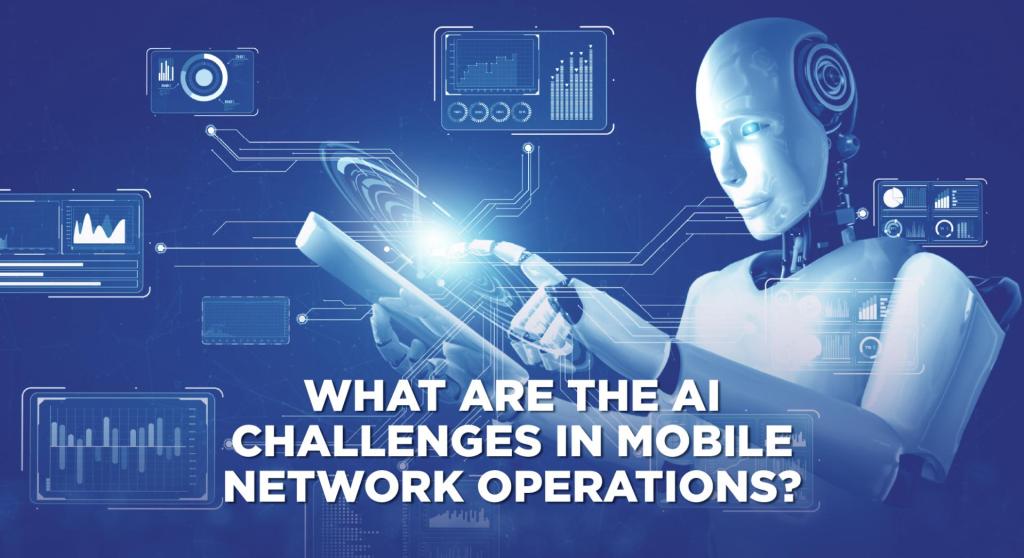In an era where telecommunications is the backbone of global connectivity, artificial intelligence (AI) revolutionizes how networks are managed and operated. Mobile Network Operations have seen immense benefits from AI-driven tools, ranging from automation to predictive analytics. Yet, with these advancements come significant challenges. Addressing these issues is crucial to unlocking the full potential of Telecom AI in network management.
The Role of AI in Mobile Network Operations
In telecom, AI goes beyond optimizing day-to-day operations; it drives innovation, efficiency, and customer satisfaction. From improving fault detection to enabling real-time adjustments, AI solutions are becoming integral to Mobile Network Operations. However, successful implementation requires telecom leaders to address challenges that could hinder their ability to scale AI-driven systems effectively.
Key Challenges of AI in Mobile Network Operations
Building a Strong Business Case for AI
AI adoption must be supported by a compelling business case. For telecom operators, this means demonstrating how AI can drive revenue, improve operational efficiency, and enable proactive decision-making. A clear roadmap showing return on investment (ROI) is critical to secure buy-in from stakeholders.
Data Complexity and Training Data Sets
AI systems rely on high-quality data for accurate predictions and automation. In telecom, managing vast and diverse datasets can be overwhelming. Moreover, preparing training data sets is often time-consuming, requiring meticulous cleaning and structuring to ensure effective AI model training.
Legacy Systems and Infrastructure Limitations
Telecom operators often deal with highly customized legacy systems, which complicate the integration of AI-driven operations. Transitioning to software-defined accelerated computing is essential to overcome these limitations and create an AI-ready infrastructure.

Skill Gap Within the Workforce
The telecom industry faces a significant skill gap in AI expertise. Operators must upskill their workforce or hire specialized talent to effectively manage and deploy AI solutions. AI initiatives may only deliver their full potential if they address this gap.
Integration of Advanced Systems
Integrating systems like MLOps, AIOps, Foundation ModelOps, and LLMOps into existing Telecom AI environments is highly complex. Seamless alignment of these tools with existing network infrastructure is a critical challenge for telecom operators.
Planning and Strategy Alignment
AI implementation must align with three key strategic areas:
Cost Reduction: Identifying cost-saving opportunities and optimizing resource allocation.
Feature Enhancements: Keeping pace with customer demands for new features and services.
Revenue Generation: Exploring new streams of revenue by leveraging AI’s capabilities.
Operators must craft a comprehensive strategy that addresses these pillars while ensuring alignment with business goals.
Sustainability Challenges
AI systems consume significant energy, not just for computation but also for cooling. With sustainability becoming a top priority for many industries, telecom operators must find ways to minimize the environmental impact of their AI deployments.
Continuous Investment and Capital Requirements
AI systems require ongoing investment to remain effective. From upgrading infrastructure to scaling operations, telecom operators must balance initial costs with long-term benefits.

Skill Gap Within the Workforce
The telecom industry faces a significant skill gap in AI expertise. Operators must upskill their workforce or hire specialized talent to effectively manage and deploy AI solutions. AI initiatives may only deliver their full potential if they address this gap.
Integration of Advanced Systems
Integrating systems like MLOps, AIOps, Foundation ModelOps, and LLMOps into existing Telecom AI environments is highly complex. Seamless alignment of these tools with existing network infrastructure is a critical challenge for telecom operators.
Planning and Strategy Alignment
AI implementation must align with three key strategic areas:
Cost Reduction: Identifying cost-saving opportunities and optimizing resource allocation.
Feature Enhancements: Keeping pace with customer demands for new features and services.
Revenue Generation: Exploring new streams of revenue by leveraging AI’s capabilities.
Operators must craft a comprehensive strategy that addresses these pillars while ensuring alignment with business goals.
Sustainability Challenges
AI systems consume significant energy, not just for computation but also for cooling. With sustainability becoming a top priority for many industries, telecom operators must find ways to minimize the environmental impact of their AI deployments.
Continuous Investment and Capital Requirements
AI systems require ongoing investment to remain effective. From upgrading infrastructure to scaling operations, telecom operators must balance initial costs with long-term benefits.
Overcoming AI Challenges in Mobile Network Operations
Investing in AI-Ready Infrastructure
Transitioning from legacy systems to modern, software-defined networks is crucial. This allows telecom operators to handle the computational demands of AI systems effectively and ensures scalability for future needs.
Focusing on Data Management
Operators must prioritize the availability and quality of training datasets. Leveraging advanced tools for data cleaning, preparation, and integration can streamline this process and improve AI model accuracy.
Building Workforce Skills
Bridging the skill gap through training programs and strategic hiring is essential. Empowering teams with the knowledge and tools to manage AI systems ensures successful adoption and operation.
Strategic Planning and Execution
A strong focus on planning is key to aligning AI initiatives with organizational goals. By addressing cost reduction, feature development, and revenue generation, operators can maximize the value of their AI investments.
Prioritizing Sustainability
Adopting energy-efficient hardware and optimizing cooling systems can reduce the environmental footprint of AI operations. Sustainable practices not only align with global goals but also enhance brand reputation.
The Future of Telecom AI in Mobile Network Operations
As telecom networks evolve to meet the demands of 5G and beyond, AI’s role will become even more critical. Telecom AI is poised to drive innovations like predictive maintenance, dynamic scaling, and enhanced customer experiences. By addressing current challenges, telecom operators can unlock new opportunities for growth, efficiency, and resilience.
Conclusion: Embracing the Potential of AI in Telecom
AI is transforming Mobile Network Operations, offering unprecedented opportunities to enhance efficiency and deliver exceptional services.

However, its successful adoption requires a strategic approach to overcome challenges like legacy systems, workforce skill gaps, and sustainability concerns. By addressing these obstacles, telecom operators can position themselves at the forefront of innovation, ensuring long-term success in an increasingly connected world.
Are you ready to unlock the potential of AI in your mobile network operations? Start today by building a solid business case and embracing the tools of tomorrow.
The Future of Telecom AI in Mobile Network Operations
As telecom networks evolve to meet the demands of 5G and beyond, AI’s role will become even more critical. Telecom AI is poised to drive innovations like predictive maintenance, dynamic scaling, and enhanced customer experiences. By addressing current challenges, telecom operators can unlock new opportunities for growth, efficiency, and resilience.

Conclusion: Embracing the Potential of AI in Telecom
AI is transforming Mobile Network Operations, offering unprecedented opportunities to enhance efficiency and deliver exceptional services.
However, its successful adoption requires a strategic approach to overcome challenges like legacy systems, workforce skill gaps, and sustainability concerns. By addressing these obstacles, telecom operators can position themselves at the forefront of innovation, ensuring long-term success in an increasingly connected world.
Are you ready to unlock the potential of AI in your mobile network operations? Start today by building a solid business case and embracing the tools of tomorrow.
